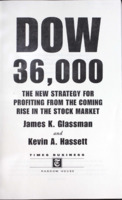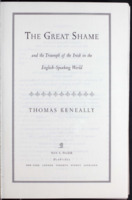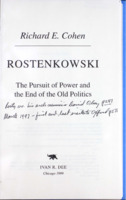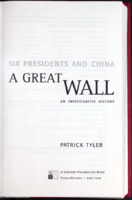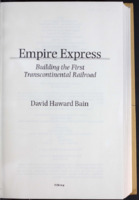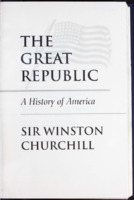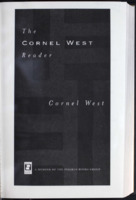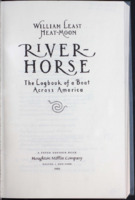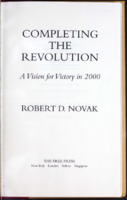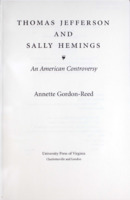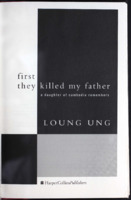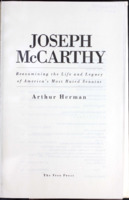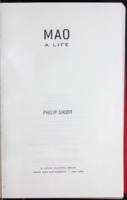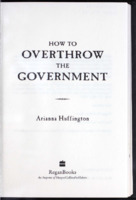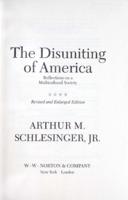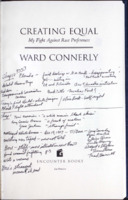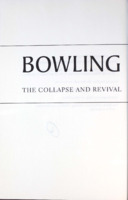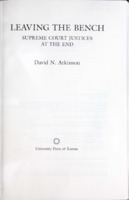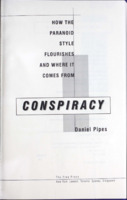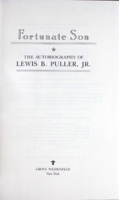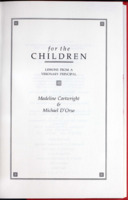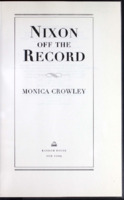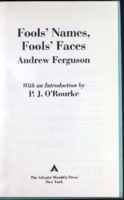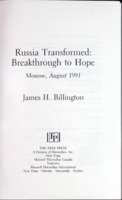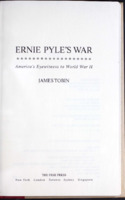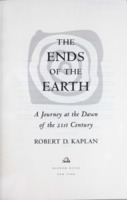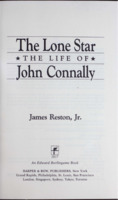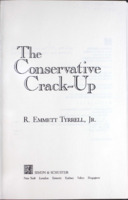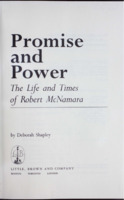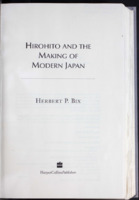Search
540 items
-
The great shame : and the triumph of the Irish in the English-speaking world
In the nineteenth century, Ireland lost half of its population to famine, emigration to the United States and Canada, and the forced transportation of convicts to Australia. The forebears of Thomas Keneally, author of Schindler's List, were victims of that tragedy, and in The Great Shame Keneally has written the full story of the Irish diaspora with the narrative grip and flair of a novel. Based on unique research among little-known sources, this book surveys eighty years of Irish history through the eyes of political prisoners - including Keneally's ancestors - who left Ireland in chains and eventually found glory, in one form or another, in Australia and America.--BOOK JACKET. -
Rostenkowski : the pursuit of power and the end of the old politics
For thirteen years, during a time of Democratic congressional dominance in Washington, Dan Rostenkowski became one of the most influential American legislators of the twentieth century. As chairman of the powerful House Ways and Means Committee, the congressman from Illinois left his mark on the nation's tax laws, international trade, Social Security, health care, welfare programs, and a good many other policies that affected most Americans. He practiced old-school politics; he passed out political favors liberally; he could be gruff and abrupt. But the route for important legislation ran through Rostenkowski's office.--BOOK JACKET."Richard Cohen's scrupulous political biography of Rostenkowski follows his rise to power from modest origins in the Democratic ward politics of Chicago's Polish northwest side, through his national legislative triumphs, and ultimately to his criminal conviction and imprisonment for abuses of House practice."--BOOK JACKET. "Mr. Cohen's story offers much more than Rostenkowski's personal tragedy; it is a tale of the transformation of American political life. Because he served so many years in Congress (1959-1995), Rostenkowski's career illuminates the changing nature of both the institution and the Democratic party."--BOOK JACKET. -
A great wall : six presidents and China : an investigative history
Studies how America's relationship with China has changed from 1969 to 1999, focusing on how American presidents have dealt with China's rulers. -
Empire express : building the first transcontinental railroad
Chronicles the events that took place in the thirty years it took to complete the first transcontinental railroad, profiling the key players in its development, the major setbacks the workers faced, and the public objections to the railroad's completion. -
The great republic : a history of America
The Great Republic' is Sir Winston Churchill's personal vision of American history, from the arrival of the first European settlers to the dawn of the Cold War, edited by his grandson, the historian and journalist Winston S. Churchill. The book is a magnificent retelling of the American story, including some of the best short histories of the Revolutionary War and the Civil War ever written. The bulk of this book, America's history up to the twentieth century; has until now been found only within Churchill's much longer four-volume 'A History of the English-Speaking Peoples, for which he was awarded the Nobel Prize for literature in 1953. The chapters on America from that larger work have been knit together into a whole, and to them Winston S. Churchill has added essays and speeches of his grandfather's, many never before published in bok form, to bring the book up to the mid-twentieth century.... -
The Cornel West reader
The best work of an always compelling, often controversial and absolutely essential philosopher of the American experience, modernity, and the human condition. -
River-horse : the logbook of a boat across America
The author sets out from New York City to sail his boat across the United States. -
Completing the revolution : a vision for victory in 2000
The conservative pundit and television personality maps out a strategy for the Republican nominee to win the 2000 Presidential election. -
Thomas Jefferson and Sally Hemings : an American controversy
Rumors of Thomas Jefferson's sexual involvement with his slave Sally Hemings have circulated for two centuries. It remains, among all aspects of Jefferson's renowned life, perhaps the most hotly contested topic. With Thomas Jefferson and Sally Hemings, Annette Gordon-Reed promises to intensify this ongoing debate as she identifies glaring inconsistencies in many noted scholars' evaluations of the existing evidence. She has assembled a fascinating and convincing argument: not that the alleged thirty-eight-year liaison necessarily took place but rather that the evidence for its taking place has been denied a fair hearing.--BOOK JACKET. "Possessing both a layperson's unfettered curiosity and a lawyer's logical mind, Annette Gordon-Reed writes with a style and compassion that are irresistible. Her analysis is accessible, with each chapter revolving around a key figure in the Hemings drama. The resulting portraits are engrossing and very personal. Gordon-Reed also brings a keen intuitive sense of the psychological complexities of human relationships - relationships that, in the real world, often develop regardless of status or race. The most compelling element of all, however, is her extensive and careful research, which often allows the evidence to speak for itself."--BOOK JACKET. -
First they killed my father : a daughter of Cambodia remembers
From a childhood survivor of Cambodia's brutal Pol Pot regime comes an unforgettable narrative of war crimes and desperate actions, the unnerving strength of a small girl and her family, and their triumph of spirit.--Dust jacket. -
Joseph McCarthy : reexamining the life and legacy of America's most hated senator
Herman’s work reconsiders the career of Senator McCarthy, particularly with respect to his investigations of suspected domestic spies for the Soviet Union. Herman explains that a new understanding this issue has been gained from sources such as the Venona intercepts (which began to be made available in 1995). This information shows that McCarthy, though often harsh, inappropriate, and prone to exaggeration, might have been on the right track in terms of his suspicions of some Americans’ loyalties during the period. -
Mao : a life
An unsentimental portrait of Mao explores the life of the peasant who rose to the position of "chairman" of China's communist party and absolute ruler of the country, overseeing both brilliant reform and terrible butchery during his long reign. -
How to overthrow the government
How to Overthrow the Government, is Huffington's call to arms; a challenge to the average American to seize the government back from the special interests that now hold it hostage and restore control to the people themselves. From campaign finance reform to new voters' rights to grassroots Internet activism and civil disobedience campaigns, she calls for fresh and radical solutions to this national crisis and offers a directory of local and national activist groups to contact that can help make it happen.--Jacket. -
The disuniting of America : reflections on a multicultural society
Examines the lessons of one polyglot country after another tearing itself apart or on the brink of doing so, and points out troubling new evidence that multiculturalism gone awry here in the United States threatens to do the same. -
Creating equal : my fight against race preferences
A story of the author's life and his struggles with "America's racial divide." As a member of the University of California Board of Regents, the author was drawn into the controversy surrounding affirmative action and "finally concluded ... that this phrase was merely a polite euphemism for an entrenched system of race preferences that psychologically damages its alleged beneficiaries and unjustly discriminates against its real victims."--Jacket. -
Bowling alone : the collapse and revival of American community
Putnam's work shows how social bonds are the most powerful predictor of life satisfaction. For example, he reports that getting married is the equivalent of quadrupling your income and attending a club meeting regularly is the equivalent of doubling your income. The loss of social capital is felt in critical ways: Communities with less social capital have lower educational performance and more teen pregnancy, child suicide, low birth weight, and prenatal mortality. Social capital is also a strong predictor of crime rates and other measures of neighborhood quality of life, as it is of our health: In quantitative terms, if you both smoke and belong to no groups, it's a close call as to which is the riskier behavior.--BOOK JACKET. -
Leaving the bench : Supreme Court justices at the end
Life appointments make Supreme Court justices among the most powerful officials in government and allow even dysfunctional judges to stay on long after they should have departed. For that reason, when a justice leaves the bench is often as controversial as when he's appointed. This first comprehensive historical treatment of their deaths, resignations, and retirements explains when and why justices do step down. It considers the diverse circumstances under which they leave office and clarifies why they often are reluctant to, showing how factors like pensions, party loyalty, or personal pride come into play. It also relates physical ailments to mental faculties, offering examples of how a justice's disability sometimes affects Court decisions.--BOOK JACKET."Ultimately, Atkinson shows just how human these people are and enhances our understanding of how the Court conducts its business. He also suggests specific ways to improve the present situation, weighing the pros and cons of mandatory retirement and calling for reform in the delegation of duties to law clerks - who in recent years have dominated the actual writing of many justices' decisions."--BOOK JACKET."As the current Court ages, how long might we expect justices to remain on the bench? Because our next president will likely make several appointments, now is the time to consider what shape the Supreme Court will take in the next century. Offering a wealth of information never before collected, Leaving the Bench provides substantial grist for that debate and will serve as an unimpeachable reference on the Court."--BOOK JACKET. -
Conspiracy : how the paranoid style flourishes and where it comes from
Was AIDS intentionally inflicted upon blacks by whites? Was JFK assassinated as part of an intricate conspiracy? Daniel Pipes traces conspiracy theories through history and convincingly shows how they have been used as common tools of mass manipulation in the West and have more recently cropped up in the Third World and among disempowered fringe groups. -
Fortunate son : the autobiography of Lewis B. Puller, Jr.
A Vietnam veteran who lost both legs and a hand in the Vietnam War recounts his homecoming and his attempts to come to terms with his life. -
For the children : lessons from a visionary principal
Educator Madeline Cartwright explains how she transformed a public school and shares her secrets and hopes for all public schools. -
Nixon off the record
With fully reconstructed conversations based on extensive notes made at the time, Nixon off the Record puts the reader in the room with the thirty-seventh president, listening to his views on leadership, his opinions of White House predecessors and successors, his activities and thoughts during the 1992 presidential campaign and election, and his assessment of Bill Clinton's first year in office and his potential challengers in 1996. Nixon's views give voters uncommon criteria by which to measure presidential candidates - including Bob Dole - and their ability to exercise effective leadership. Richard Nixon was one of the most controversial and indestructible presidents of the twentieth century. With her privileged perspective and unlimited access to Nixon, Crowley has written a perceptive and spirited memoir that shows not just what Nixon thought in the last years of his life but who he was. She offers an unprecedented behind-the-scenes view of Nixon's activities and opinions, giving the reader a front-row view of recent American political history. Nixon's unparalleled experience placed him in a unique position to judge leaders who had come before and after. His assessments are candid, astonishing, and sometimes explosive. This book places those judgments in context and brings them alive for the last American presidential election of the twentieth century. -
Fools' names, fools' faces
Andrew Ferguson's collection of thirty-two essays reprinted from the New Republic, the Wall Street Journal and other publications. -
Russia transformed : breakthrough to hope : Moscow, August 1991
James Billington examines the changes that have occurred in the former Soviet Union over recent years. -
Ernie Pyle's war : America's eyewitness to World War II
When a machine-gun bullet ended the life of war correspondent Ernie Pyle in the final days of World War II, Americans mourned him in the same breath as they mourned Franklin Roosevelt. To millions, the loss of this American folk hero seemed nearly and great as the loss of the wartime president. If the hidden horrors and valor of combat persist at all in the public mind, it is because of those writers who watched it and recorded it in the faith that war is too important to be confined to the private memories of the warriors. Above all these writers, Ernie Pyle towered as a giant. Through his words ad his compassion, Americans everywhere gleaned their understanding of what they came to call "The Good War." Pyle walked a troubled path to fame. Though insecure and anxious, he created a carefree and kindly public image in his popular prewar column - all the while struggling with inner demons and a tortured marriage. War, in fact, offered. Pyle an escape hatch from his own personal hell. It also offered him a subject precisely suited to his talent - a shrewd understanding of human nature, an unmatched eye for detail, a profound capacity to identify with the suffering soldiers whom he adopted as his own, and a plain yet poetic style reminiscent of Mark Twain and Will Rogers. These he brought to bear on the Battle of Britain and all the great American campaigns of the war - North Africa, Sicily, Italy, D-Day, and Normandy, the liberation of Paris, and finally Okinawa, where he felt compelled to go because of his enormous public stature despite premonitions of death. -
The ends of the earth : a journey at the dawn of the 21st century
In The Ends of the Earth, Robert D. Kaplan travels from the devastated countries of West Africa and the fundamentalist enclaves of Egypt and Iran to the culturally explosive lands of Central Asia, India, Pakistan, and Southeast Asia with hardly more than a notebook and a backpack. Kaplan's intention was to investigate firsthand the effect of population explosion and environmental degradation in these countries and to see how the various cultures he encountered responded to them. But as he traveled, talking to gun smugglers and government ministers, warlords and shantytown dwellers, he discovered that the real problem, in places as far afield as Sierra Leone and western China, was the reemergence of longstanding cultural rivalries and the dissolution of national boundaries as regions redefine themselves along ethnic and historic lines.Kaplan's ground-level experiences allow him to avoid grandiose generalizations about the clash of civilizations and to replace them with intimate portraits of the men and women he encounters: Rafighdoost, Khomeini's fiercely loyal chauffeur; Ali Abdel Razag, keeper of the Aswan High Dam; and Ayshe Tanrikulu, a squatter on Golden Mountain, a shantytown on the outskirts of Ankara, who hopes that her sons will one day be doctors or engineers. It is in the squalor of daily existence and in people's fears, frustrations, and dreams that Kaplan looks for the key to a country's future. The Ends of the Earth offers an intimate portrait of the devastated parts of the world, whose cultural disasters - like those in Bosnia, Chechnya, and Rwanda today - will dominate our attention and remake the world of tomorrow. -
The lone star : the life of John Connally
A biography of Connally's life includes his twenty years of political power, his return to Texas and riches, and then bankruptcy. -
The conservative crack-up
R. Emmett Tyrrell, Jr.'s commentary of the state of conservatism during the 1990s. -
Promise and power : the life and times of Robert McNamara
Promise and Power: The Life and Times of Robert McNamara is the first major biography, and only complete history, of this enigmatic man who has been a towering figure of the twentieth century. Here is the dramatic story of a brilliant but flawed leader who struggled endlessly to reconcile his Berkeley-bred social conscience with his raw drive for power. From his position as the wunderkind president of the Ford Motor Company, to his reign as secretary of defense during the Vietnam War, through his efforts as the president of the World Bank, Deborah Shapley paints an electric portrait of Robert Strange McNamara. To a generation of Americans, the name McNamara spells a nightmare in jungle green: Vietnam. Promise and Power traces how McNamara shaped the American commitment in Vietnam - and his devastating inner realization of his error. McNamara has remained silent on the war since February 1968, when he stepped down as America's secretary of defense, but in this book, for the first time, he admits, "The greatest failure of all was Vietnam." Promise and Power shows, as no other book has, how the moral ambiguity all Americans feel about Vietnam's shocking result is shared by the man who led them there. But McNamara's life story spans a wider swath of our history. Shapley describes his roots in the generation of Americans who came of age in the 1930s, his upbringing in the plain town of Oakland, California, and formative years at the liberal Berkeley campus and Harvard Business School. After World War II, talent and raw ambition pushed him to the top of Ford; he became president in 1960 and reshaped the organization. Yet he fought the company's values, too, and drew up plans to change Ford to meet foreign competition - revealed here for the first time. McNamara's fame as a captain of industry who also read Teilhard de Chardin spurred President-elect John F. Kennedy to name him secretary of defense. With Camelot-inspired activism, McNamara used management controls to revolutionize the American military, revealing the driven man whom the press dubbed "I've-Got-All-the-Answers McNamara." Promise and Power is the first profile of how McNamara was changed by failure and by the discovery all Americans made in the 1970s of the strength and power of the Third World. As president of the World Bank, McNamara marched through slums and shantytowns, holding out the promise of effective aid. He either saved the Third World or lost it, depending, of course, on which government's or banker's view is believed. Promise and Power, featuring exclusive interviews with the subject himself and four hundred other participants, and meticulous research, explores the effects of war and remembrance on this complex figure. Robert McNamara, the private individual and the public technocrat, stands before us, in light and shadow, as a remarkable man whose own promise and power changed America, and the world. -
Hirohito and the making of modern Japan
A biography of the Japanese emperor reveals a powerful man who successfully cultivated an image of a reluctant king while manipulating important events behind the scenes for five decades.
